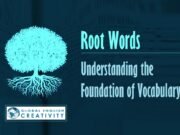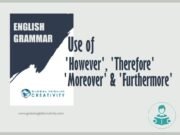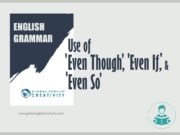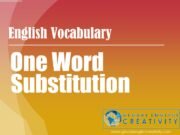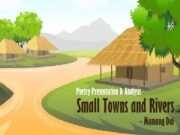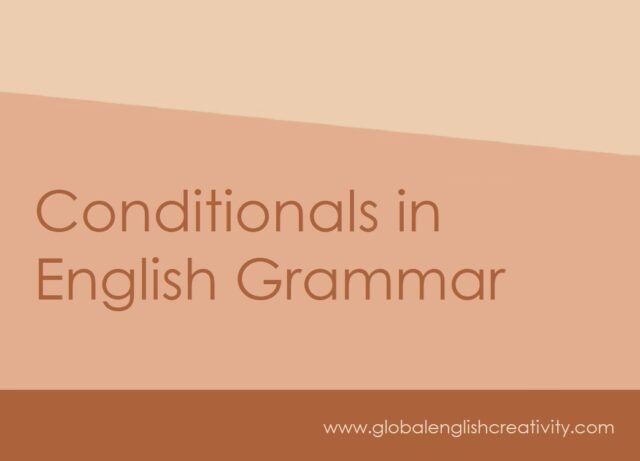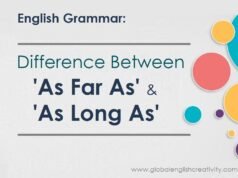Conditionals in English Grammar
Conditionals are an essential aspect of English grammar that expresses possibilities, hypotheses, and consequences. They allow speakers to discuss events that are dependent on certain conditions. Let’s learn the different types of conditionals, their structures, and their uses.
Zero Conditional
Structure: If + present simple, present simple
Usage: The zero conditional is used for general truths, scientific facts, and things that are always true when the condition is met.
Example: ‘If you heat water to 100 degrees Celsius, it boils.’
In this example, heating water to 100 degrees Celsius is a condition that always results in the water boiling. There is no uncertainty or exception.
First Conditional
Structure: If + present simple, will + base verb
Usage: The first conditional is used to talk about real and possible situations in the future. It describes a probable result that will happen if a certain condition is met.
Example: ‘If it rains tomorrow, we will cancel the picnic.’
Here, the condition (it raining) is possible, and the result (cancelling the picnic) is a likely response to that condition.
Second Conditional
Structure: If + past simple, would + base verb
Usage: The second conditional is used for hypothetical or unlikely situations in the present or future. It often expresses dreams, wishes, or unreal situations.
Example: ‘If I won the lottery, I would travel the world.’
In this sentence, winning the lottery is an unlikely event, and traveling the world is a hypothetical result of that condition.
Third Conditional
Structure: If + past perfect, would have + past participle
Usage: The third conditional is used to discuss hypothetical situations in the past, situations that did not happen, and their imagined results.
Example: ‘If she had studied harder, she would have passed the exam.’
This sentence talks about a past condition that was not met (studying harder) and the hypothetical result that did not occur (passing the exam).
Mixed Conditionals
Mixed conditionals combine two different times in one conditional sentence. The most common types are combinations of second and third conditionals.
Type 1: Present result of a past condition
Structure: If + past perfect, would + base verb
Example: ‘If I had known about the meeting, I would be there now.’
In this example, the past condition (knowing about the meeting) affects the present result (being at the meeting).
Type 2: Past result of a present or continuing condition
Structure: If + past simple, would have + past participle
Example: ‘If she were more organized, she would have finished the project on time.’
Here, the present condition (being more organized) is linked to a past result (finishing the project on time).
Common Pitfalls
Using the wrong tense: Ensure that the tense matches the type of conditional you’re using.
Incorrect: If I will see her, I would tell her.
Correct: If I see her, I will tell her.
Mixing up the condition and result: Be clear about which clause represents the condition and which represents the result.
Incorrect: I will be happy if you will come to the party.
Correct: I will be happy if you come to the party.
Confusing hypothetical with real situations: Use second and third conditionals for hypothetical or unreal situations and first conditional for real, possible situations.
Incorrect: If I win the lottery, I would buy a house.
Correct: If I win the lottery, I will buy a house.
Practice and Usage
To master conditionals, practice by creating sentences for each type and use them in real-life conversations. Pay attention to the tense and the structure of each conditional type. Here are a few exercises:
- Create a zero conditional sentence about a scientific fact.
- Write a first conditional sentence about a plan for the weekend.
- Formulate a second conditional sentence about a dream job.
- Construct a third conditional sentence about a past regret.
- Mix conditionals to describe present consequences of past actions or vice versa.
Understanding and correctly using conditionals will significantly enhance your English communication skills, allowing you to express a wide range of possibilities, hypotheses, and outcomes with precision and clarity.
also read:
| ONLINE GRAMMAR QUIZZES with CERTIFICATES |
| ENGLISH GRAMMAR_1 |
| ENGLISH GRAMMAR_2 |
| GRAMMAR: SPOT THE ERROR |
| USEFUL EXPRESSIONS IN ENGLISH SPEAKING |
| WORD FORMATION PROCESSES |
| PHONETICS |


